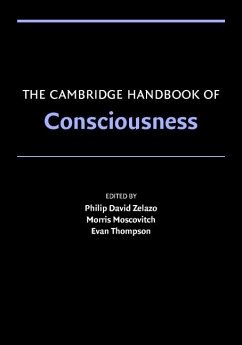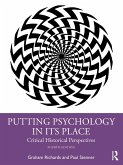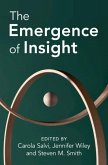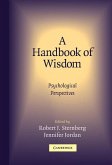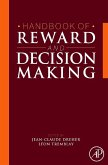Cambridge Handbook of Consciousness (eBook, ePUB)
Redaktion: Zelazo, Philip David


Alle Infos zum eBook verschenken

Cambridge Handbook of Consciousness (eBook, ePUB)
Redaktion: Zelazo, Philip David
- Format: ePub
- Merkliste
- Auf die Merkliste
- Bewerten Bewerten
- Teilen
- Produkt teilen
- Produkterinnerung
- Produkterinnerung

Hier können Sie sich einloggen

Bitte loggen Sie sich zunächst in Ihr Kundenkonto ein oder registrieren Sie sich bei bücher.de, um das eBook-Abo tolino select nutzen zu können.
The Cambridge Handbook of Consciousness is the first of its kind in the field, and its appearance marks a unique time in the history of intellectual inquiry on the topic. After decades during which consciousness was considered beyond the scope of legitimate scientific investigation, consciousness re-emerged as a popular focus of research towards the end of the last century, and it has remained so for nearly 20 years. There are now so many different lines of investigation on consciousness that the time has come when the field may finally benefit from a book that pulls them together and, by…mehr
- Geräte: eReader
- mit Kopierschutz
- eBook Hilfe
- Größe: 13.18MB
- FamilySharing(5)
![Cambridge Handbook of the Intellectual History of Psychology (eBook, ePUB) Cambridge Handbook of the Intellectual History of Psychology (eBook, ePUB)]() Cambridge Handbook of the Intellectual History of Psychology (eBook, ePUB)31,95 €
Cambridge Handbook of the Intellectual History of Psychology (eBook, ePUB)31,95 €![Cambridge Handbook of Sociocultural Psychology (eBook, ePUB) Cambridge Handbook of Sociocultural Psychology (eBook, ePUB)]() Cambridge Handbook of Sociocultural Psychology (eBook, ePUB)32,95 €
Cambridge Handbook of Sociocultural Psychology (eBook, ePUB)32,95 €![Putting Psychology in its Place (eBook, ePUB) Putting Psychology in its Place (eBook, ePUB)]() Graham RichardsPutting Psychology in its Place (eBook, ePUB)48,95 €
Graham RichardsPutting Psychology in its Place (eBook, ePUB)48,95 €![Emergence of Insight (eBook, ePUB) Emergence of Insight (eBook, ePUB)]() Emergence of Insight (eBook, ePUB)25,95 €
Emergence of Insight (eBook, ePUB)25,95 €![Handbook of Wisdom (eBook, ePUB) Handbook of Wisdom (eBook, ePUB)]() Handbook of Wisdom (eBook, ePUB)27,95 €
Handbook of Wisdom (eBook, ePUB)27,95 €![Handbook of Reward and Decision Making (eBook, ePUB) Handbook of Reward and Decision Making (eBook, ePUB)]() Handbook of Reward and Decision Making (eBook, ePUB)96,95 €
Handbook of Reward and Decision Making (eBook, ePUB)96,95 €![The Psychology of Artificial Intelligence (eBook, ePUB) The Psychology of Artificial Intelligence (eBook, ePUB)]() Tony PrescottThe Psychology of Artificial Intelligence (eBook, ePUB)13,95 €
Tony PrescottThe Psychology of Artificial Intelligence (eBook, ePUB)13,95 €-
-
-
Dieser Download kann aus rechtlichen Gründen nur mit Rechnungsadresse in A, B, BG, CY, CZ, D, DK, EW, E, FIN, F, GR, HR, H, IRL, I, LT, L, LR, M, NL, PL, P, R, S, SLO, SK ausgeliefert werden.
- Produktdetails
- Verlag: Cambridge University Press
- Erscheinungstermin: 14. Mai 2007
- Englisch
- ISBN-13: 9781316262443
- Artikelnr.: 52970634
- Verlag: Cambridge University Press
- Erscheinungstermin: 14. Mai 2007
- Englisch
- ISBN-13: 9781316262443
- Artikelnr.: 52970634
- Herstellerkennzeichnung Die Herstellerinformationen sind derzeit nicht verfügbar.
Morris Moscovitch is the Max and Gianna Glassman Chair in Neuropsychology and Aging in the Department of Psychology at the University of Toronto. He is also the Senior Scientist at the Rotman Research Institute of Baycrest Centre for Geriatric Care. His research focuses on the neuropsychology of memory in humans while also studying attention, face-recognition, and hemispheric specialization in young and older adults, and in people with brain damage.
Evan Thompson is Professor of Philosophy at the University of Toronto. He is the author of Mind in Life: Biology, Phenomenology, and the Sciences of Mind and Colour Vision: A Study in Cognitive Science and the Philosophy of Perception. He is also the co-author of The Embodied Mind: Cognitive Science and Human Experience. He is a former holder of a Canada Research Chair.
Thompson; Part II. The Cognitive Science of Consciousness: 2. A brief
history of the philosophical problem of consciousness William Seager; 3.
Philosophical theories of consciousness: contemporary Western perspectives
Uriah Kriegel; 4. Philosophical theories of consciousness: continental
perspectives Evan Thompson and Dan Zahavi; 5. Philosophical theories of
consciousness: Asian perspectives George Dreyfus and Evan Thompson; 6.
Artificial intelligence and consciousness Drew McDermott; 7. Computational
models of consciousness: a taxonomy and some examples Ron Sun and Stan
Franklin; 8. Cognitive theories of consciousness Katherine McGovern and
Bernard J. Baars; 9. Behavioral, neuroimaging, and neuropsychological
approaches to implicit perception Dan Simons, Deborah E. Hannula, David E.
Warren and Steven W. Day; 10. Three forms of consciousness in retrieving
memories Henry L. Roediger III, Suparna Rajaram and Lisa Geraci; 11.
Metacognition and consciousness Asher Koriat; 12. Consciousness and control
of action Carlo Umilta; 13. Language and consciousness Wallace Chafe; 14.
Narrative modes of consciousness and selfhood Keith Oatley; 15. The
development of consciousness Philip David Zelazo, Helena H. Gao and Rebecca
Todd; 16. States of consciousness: normal and abnormal variation J. Allan
Hobson; 17. Consciousness in hypnosis John F. Kihlstrom; 18. Can we study
subjective experiences objectively? First-person perspective approaches and
impaired subjective states of awareness in schizophrenia? Jean-Marie Danion
and Caroline Huron; 19. Meditation and the neuroscience of consciousness:
an introduction Antoine Lutz, John D. Dunne and Richard J. Davidson; 20.
Social psychological approaches to consciousness John Bargh; 21. The
evolution of consciousness Michael C. Corballis; 22. The serpent's gift:
evolutionary psychology and consciousness Jesse Bering and Dave Bjorklund;
23. Anthropology of consciousness C. Jason Throop and Charles Laughlin; 24.
Motivation, decision making, and consciousness: from psychodynamics to
subliminal priming and emotional constraint satisfaction Drew Westen, Joel
Weinberger and Rebekah Bradley; Part III. The Neuroscience of
Consciousness: 25. Hunting the ghost: toward a neuroscience of
consciousness Petra Stoerig; 26. Neurodynamical approaches to consciousness
Diego Cosmelli, Jean-Philippe Lachaux and Evan Thompson; 27. The thalamic
intralaminar nuclei and the property of consciousness Joseph E. Bogen; 28.
The cognitive neuroscience of memory and consciousness Scott D. Slotnick
and Daniel L. Schachter; 29. The affective neuroscience of consciousness:
higher order syntactic thoughts, dual routes to emotion and action, and
consciousness Edmund Rolls; 30. Consciousness: situated and social Ralph
Adolphs; 31. Quantum approaches to consciousness Henry Stapp.
Thompson; Part II. The Cognitive Science of Consciousness: 2. A brief
history of the philosophical problem of consciousness William Seager; 3.
Philosophical theories of consciousness: contemporary Western perspectives
Uriah Kriegel; 4. Philosophical theories of consciousness: continental
perspectives Evan Thompson and Dan Zahavi; 5. Philosophical theories of
consciousness: Asian perspectives George Dreyfus and Evan Thompson; 6.
Artificial intelligence and consciousness Drew McDermott; 7. Computational
models of consciousness: a taxonomy and some examples Ron Sun and Stan
Franklin; 8. Cognitive theories of consciousness Katherine McGovern and
Bernard J. Baars; 9. Behavioral, neuroimaging, and neuropsychological
approaches to implicit perception Dan Simons, Deborah E. Hannula, David E.
Warren and Steven W. Day; 10. Three forms of consciousness in retrieving
memories Henry L. Roediger III, Suparna Rajaram and Lisa Geraci; 11.
Metacognition and consciousness Asher Koriat; 12. Consciousness and control
of action Carlo Umilta; 13. Language and consciousness Wallace Chafe; 14.
Narrative modes of consciousness and selfhood Keith Oatley; 15. The
development of consciousness Philip David Zelazo, Helena H. Gao and Rebecca
Todd; 16. States of consciousness: normal and abnormal variation J. Allan
Hobson; 17. Consciousness in hypnosis John F. Kihlstrom; 18. Can we study
subjective experiences objectively? First-person perspective approaches and
impaired subjective states of awareness in schizophrenia? Jean-Marie Danion
and Caroline Huron; 19. Meditation and the neuroscience of consciousness:
an introduction Antoine Lutz, John D. Dunne and Richard J. Davidson; 20.
Social psychological approaches to consciousness John Bargh; 21. The
evolution of consciousness Michael C. Corballis; 22. The serpent's gift:
evolutionary psychology and consciousness Jesse Bering and Dave Bjorklund;
23. Anthropology of consciousness C. Jason Throop and Charles Laughlin; 24.
Motivation, decision making, and consciousness: from psychodynamics to
subliminal priming and emotional constraint satisfaction Drew Westen, Joel
Weinberger and Rebekah Bradley; Part III. The Neuroscience of
Consciousness: 25. Hunting the ghost: toward a neuroscience of
consciousness Petra Stoerig; 26. Neurodynamical approaches to consciousness
Diego Cosmelli, Jean-Philippe Lachaux and Evan Thompson; 27. The thalamic
intralaminar nuclei and the property of consciousness Joseph E. Bogen; 28.
The cognitive neuroscience of memory and consciousness Scott D. Slotnick
and Daniel L. Schachter; 29. The affective neuroscience of consciousness:
higher order syntactic thoughts, dual routes to emotion and action, and
consciousness Edmund Rolls; 30. Consciousness: situated and social Ralph
Adolphs; 31. Quantum approaches to consciousness Henry Stapp.
